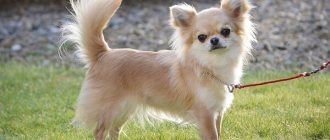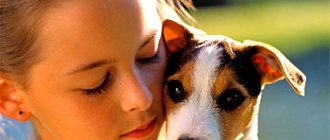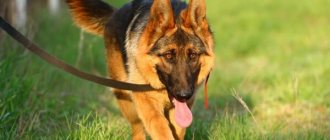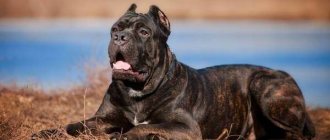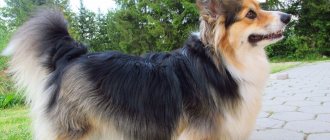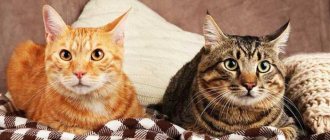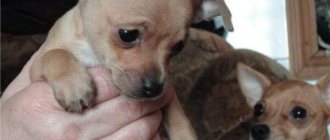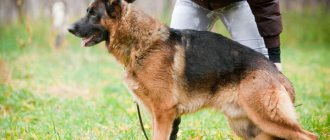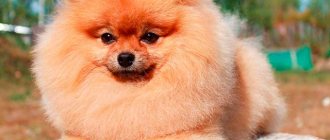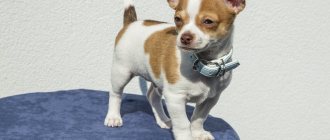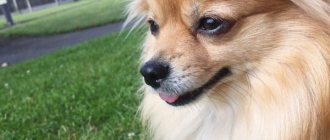Chihuahuas are one of the most popular dogs in the world. This little pet does not take up much space, but is very brave, kind, smart and loyal. This is an ideal dog for a city apartment. But it is not suitable for everyone; Chihuahuas have both advantages and disadvantages.
- Head
- Is training necessary?
- Hygiene
Breed traits
Breed traits (on a 5-point scale)
| Chihuahua | |||
| Activity | in the house | 3.3 | |
| on the street | 3.2 | ||
| Obedience | training | 3.3 | |
| strangers | 3.4 | ||
| Domination | in family | 2.5 | |
| over dogs | 3.2 | ||
| Defending your territory | from people | 3.1 | |
| from dogs | 3.5 | ||
| Sociability | in family | 4.5 | |
| with strangers | 3.2 | ||
| with dogs | 2.5 | ||
| Concentration | in family | 1.2 | |
| in front of strangers | 2.5 | ||
| with dogs | 3 | ||
| Aggressiveness | in family | 1.6 | |
| to strangers | 2.4 | ||
| to the dogs | 3 | ||
| to cats | 2.9 | ||
| Family behavior | calmness | 3.8 | |
| demand for affection | 4.5 | ||
| excitability | 4.1 | ||
| playfulness | 4.2 | ||
| excessive barking | 2.8 | ||
| behavioral breakdowns | 1.6 | ||
| Tolerance for children | up to 4 years | 2.9 | |
| over 4 years old | 3.4 | ||
| Institutional use | watchman | 3.8 | |
| bodyguard | 2.1 | ||
This breed is often compared to the following dog breeds: Pomeranian, Papillon, Miniature Pinscher, Yorkshire Terrier, Jack Russell Terrier.
Description of the Chihuahua breed
The Chihuahua is a miniature-sized dog. It is not just decorative, but pocket-sized. The smallest specimens are easy to fit into a pocket. These pets are often taken with them everywhere, they are accepted in hotels and trains, and many owners even take them to social events.
The photo of the Chihuahua breed shows how small and cute they are.
Mini chihuahua
This little dog has the following features:
- she is fearless, barks at anyone she considers a threat, and can come into conflict with a large dog;
- they get along well with pets, especially if they grow up together;
- they are playful, active, but do not require much exercise, so they are ideal for keeping at home;
- cannot stand loneliness, can be intrusive - they will follow the owner everywhere, they are jealous of him;
- By the end of the first year of life they become adults.
Chihuahuas are the best pets to keep in a city apartment. They are suitable for single people, pensioners, and the disabled. It is not recommended to have a Chihuahua for families with small children. The point is not only that this dog does not tolerate rude treatment and will not be kind to children. A child may accidentally injure the dog.
Chihuahuas can live on average 11-14 years. But with sufficient care and proper diet, life expectancy can increase to 20 years.
The video gives a description of the breed and interesting facts about it:
Pros of the breed
Every dog breed has its advantages, and the Chihuahua is no exception. Why are they popular:
- the unusual appearance of the Chihuahua and its miniature size make it incredibly attractive and charming;
- This is an ideal pet that gets along well even in a small apartment;
- you can take it with you on a trip;
- it is easy to train to go to the toilet on a tray or diaper, this is very convenient for those who cannot walk their pet several times a day;
- maintenance is minimal and uncomplicated;
- develops good relationships with other pets, but may be jealous;
- this dog is small in size, but has a loud, ringing voice and good hearing, so they warn their owners about the arrival of strangers;
- stable psyche, curiosity, intelligence;
- this is a devoted friend, companion, supporting the owner in everything and bravely protecting him from any dangers;
- they become attached to one person, feel his mood, and are kind.
Many photographs show how these pets live in a family, where they are loved, and why people get them.
Little chihuahua
Cons of the breed
But these mini dogs are not suitable for everyone. There are several reasons why some people may not want to own a Chihuahua:
- they are very fragile, easily injured by simply falling off the sofa or if someone steps on them;
- they are constantly cold, they need to be warmed, and for walking they need clothes, sometimes shoes;
- in hot weather they quickly overheat;
- despite their small size, they have an active metabolism, so they need a lot of food, and they go to the toilet often;
- after bathing, it is necessary to dry and protect from drafts, as they quickly catch cold;
- due to the special structure of their muzzle, they have problems with the respiratory system;
- these little dogs are big bullies, they bark at big dogs, when walking you need to protect them from conflicts;
- these are stubborn, hot-tempered and touchy dogs, sometimes aggressive, and can even bite;
- loyal to only one master and obey him;
- when alone they can bark and spoil things;
- they are emotional, react sharply to loud sounds, unfamiliar people, and due to a weak bladder in such situations, uncontrolled urination occurs;
- they often have congenital diseases.
Varieties
Chihuahuas, like other breeds, have several varieties. They differ in coat length, size, and build.
- Cobby is a Chihuahua with a stocky body, a large round head, and bulging eyes. Their legs are muscular and their chest is voluminous.
- Deer, unlike cobbies, have an elegant build. They have thin legs, a small head, on which large ears stand out.
- Mini Chihuahuas weigh only 0.5-1 kg. They are short in stature - from 15 cm.
- Smooth-haired Chihuahuas have short, smooth hair that lies close to the body. There is no undercoat, longer hairs on the neck and tail.
- Long-haired Chihuahuas have soft fur. The fur is thin, most of it on the chest, paws, and tail. There are tassels at the ends of the ears.
From the photographs you can understand what smooth-haired and long-haired dogs look like.
Smooth coated chihuahua
Longhaired Chihuahua
Briefly about the main thing
- Chihuahua is a decorative breed of dog, characterized by its small size and beautiful appearance. Some representatives have a genetic predisposition to diseases.
- Advantages of the breed: appearance, economical maintenance, calm attitude towards other animals and compact size.
- Disadvantages include moodiness, risk of congenital diseases, poor resistance to cold and a need for attention.
What pros and cons do you know? Share in the comments.
History of the Chihuahua breed
This is the only small dog that has appeared in the wild. They were known several thousand years ago in Mexico. Among the Inca and Toltec Indians, this was a sacred animal; they were bred to protect the house from evil spirits. Another theory about the origin of the Chihuahua dog is that they were sacrificed or eaten. This is indicated by numerous images of small dogs in temples and on dishes, as well as rock paintings. The Indians called them Techichi.
After the conquest of America, the breed began to die out. The Europeans called this small dog the Chihuahua because there were many of them in the city of Chihuahua. Only in the 19th century did the revival of the breed begin. American breeders began looking for these small dogs. Purebred individuals have been found in Indian families. From them began the breeding of Chihuahuas. But it was only at the beginning of the 20th century that the breed was recognized in America. The first standard was adopted in 1923. And gradually the breed spread throughout the world.
In Russia, the first Chihuahuas were 2 puppies given to Khrushchev by Fidel Castro. From them began the domestic history of the breed. But they were not particularly popular. Only in the 21st century did interest in these small pets awaken. And it's not just about the miniature size. If you understand the features of the appearance and character of Chihuahuas, it will become clear why they are so popular now.
There is an interesting description of the breed in the video:
Vladimir's story, St. Petersburg
Magda, girl, 1 year old I chose the dog myself, and approached this matter with all possible responsibility. I was a little frightened by the difficulties in raising a puppy, and the responsibility for a small creature is serious. The Chihuahua breed attracted me with its small size, loyal, easy-going character, and the possibility of trouble-free keeping in an apartment.
Everything I expected from the puppy came true! Magda is a real miracle, faithful, full of love, attentive, obedient. We walk her every day, except in bad weather (the dog is diaper trained).
The breeder recommended feeding her Hilsom, and we were pleased with it. Magda eats it well, is completely healthy, jumps briskly around the apartment, and grows day by day.
During the process of raising her, some difficulties arose only when trying to accustom her to a diaper - this process dragged on for about 4 months. But now everything is fine.
The main thing is that now we always look under our feet so as not to accidentally step on a crumb. But Magda spends most of her time on someone’s lap or in someone’s arms—she likes attention, care, and affection.
Breed standard
Chihuahuas are pets with an unusual appearance. This is due to the fact that they come from the ancient Mexican Techichi dogs. But they were crossed with terriers, pinschers, and spitz dogs. The result is a mini pocket dog. The Chihuahua standard, with minor changes, was adopted in 2010.
According to him, this is a small dog, the height at the withers of which is from 15 to 23 cm, and females are slightly larger than males. Chihuahuas can weigh from 500 g to 3 kg, the most common parameters are 1.5-2.5 kg.
Head
This dog's head is large and round. The shape resembles an apple. The muzzle is cone-shaped, but wide and short. The transition from forehead to muzzle is clearly pronounced. The lips fit tightly to the jaw, the bite is scissor-shaped, but can be straight.
Chihuahuas' eyes are large, round, and sometimes protruding. They should be dark. The nose is short and slightly turned up. The color of the lobe is preferably black, but sometimes it is brown or light. Chihuahuas have large erect ears. They are triangular, wide at the base and set high. When the dog is calm, the ears are spread apart.
Torso
The build of these dogs is usually stocky and strong. Only minis can be graceful, with thin legs. But usually this dog has a compact body, a muscular build, a straight back, and does not sag towards the croup. The chest is wide, deep, the stomach is tucked. The neck is muscular and of medium length. The tail is short and set high. It is curved like a sickle towards the lower back.
Limbs
The front legs are straight, set parallel, elbows tightly pressed to the sides. The hind legs are also parallel and muscular. The feet are small, arched, and the toes are slightly spaced.
Wool
Chihuahuas come in short-haired and long-haired varieties. The first hair is smooth and fits tightly. The shortest fur is on the head, and the longer fur is on the ears and tail. The long-haired variety is soft, wavy, and has a thick undercoat. The longest hairs are on the ears, neck and paws.
The Chihuahua's coat color can be almost any color. Regardless of whether a dog is short-haired or long-haired, its colors are white, black, red, lilac, and blue. There are several common colors of Chihuahuas.
- White Chihuahuas come without any admixture of other shades.
- Completely black Chihuahuas are rare. They usually have white or milky tan marks on their toes, tail, and chest.
- Chocolate Chihuahuas are brown and have a reddish tint.
- Dogs can be red and tan. Color varies from light to chocolate.
- The brindle color looks unusual. It's fawn with a lot of black, it can be any pattern.
Defects in appearance
Representatives of this breed can differ greatly from each other in external qualities. There are certain standards that they must meet. For those who buy this little dog for themselves, this is not so important. But there are several defects due to which a dog will not be allowed for exhibitions and breeding:
- deep-set or bulging eyes;
- short neck;
- narrow elongated muzzle;
- short or pointed ears;
- open fontanel on the skull;
- long body;
- high legs and small head;
- deviations from norms of weight and height;
- marble color.
The photographs show how smooth-haired and long-haired purebred dogs should look correctly:
Smooth coated chihuahua
Longhaired Chihuahua
Colors
The Chihuahua breed can be any color, with the exception of merle: dogs of this color are born with genetic diseases.
The pet's passport indicates one of 12 possible colors and their varieties.
White
Such dogs are snow-white, without spots or specks. The nose is black, brown or pink, and the rims of the lips and eyes are light.
33 breeds of white dogs.
Black
There are three varieties:
- Pure black. Completely black or with a small white spot on the chest. Snow-white paw tips are also allowed.
- Black and white. Against a dark background, light spots on the paws, chest, and tip of the tail stand out well. Markings of the same color on the neck and head are acceptable.
- White black. The main color is snow-white, with black spots on the body and/or head contrasting with it.
42 black dog breeds.
Blue
Pure blue color is also called diluted. Pets of this color are almost completely blue, not counting small light inclusions. The lobe, rim of the eyes and lips are gray.
Like the previous suit, blue has two subtypes: in combination with snow-white spots and white-blue.
Chocolate
With a purely chocolate color, the dog is all or almost completely brown. Varieties: chocolate with snow-white and white-chocolate.
Lilac
Another name is bleached brown. The coat is completely lilac (with possible snow-white spots), the nose, rims of the lips, and eyes are the same color.
There are also two varieties of this suit: lilac and white and white and lilac.
Sable
Sable colors include many types of colors and their varieties:
- Fawn with blackening. Sable with tan and dark tips of hair on the ears, head, back, tail. The nose, eye and lip rims are also black. There may be light marks on the fingers and on the chest. It is divided into two subspecies: with snow-white splashes and white-fawn with blackening.
- Red with blackening. Sable-red coloring with dark tips of hairs and possible snow-white spots. Nose, eyelids, lips - black. Like other colors, there are two subtypes: with white markings and white-red.
- Fawn with blue shading. Blue-fawn, with possible light markings. The ends of the hair, nose, lips, eyelids are gray. The varieties are the same: with light spots on a fawn background and white-fawn with blue shading.
- Red with blue shading. Combines red and blue-sable colors. The nose, lips, eyes are gray, the ends of the hair are bluish. Light spots on the paws and chest are allowed. Subspecies: with light markings and white-red with blue shading.
- Fawn with chocolate shading. The fawn color is combined with brown tips of the coat. The color of the nose, eyes, lips - in that darkening. Snow-white inclusions are allowed. This color also has two varieties: with light markings and white-fawn with chocolate shading.
- Red with chocolate shading. Similar to other sable colors, but the tips of the hair are colored red, and the lips, eyes, and nose are brown. There are also subspecies with light spots and white-red with chocolate darkening.
- Fawn with a lilac tint. The main color is fawn, and the tips of the hairs are colored purple. There are color combinations with light splashes or a white background with fawn-lilac spots.
Ginger
Like other colors, there are three types:
- Intense red. Pure red without darkening.
- Red with white spots. Light areas are clearly visible on the red background.
- White and red. The white coat is decorated with pure red markings on the head or body.
40 breeds of dogs with red color.
Pale yellow
Pure fawn color is characterized by a light red coat color without darkening. There may be light spots on the chest and paws.
Subspecies are also distinguished: fawn with light splashes and white-fawn.
Cream
It is also called highly bleached red. With this color, the coat is cream-colored. As in other colors, lightened markings on the paws and chest are allowed.
The varieties are the same: with light markings and white-cream.
Tan
There are four main types and their varieties in this color.
- Black and tan. Pure black with tan and possible snow-white splashes on the chest and tips of the paws. Subspecies: with light markings and tricolor with a predominant white background (more than 50%).
- Chocolate and tan. It also exists in three varieties: pure chocolate and tan, with snow-white spots and tri-color.
- Blue and tan. Clean, with white markings and tricolor.
- Lilac and tan. The lilac background is combined with light red tan. The subspecies are the same: with snow-white spots and tricolor.
brindle
Rare and interesting color. On a fawn or red background there are alternating vertical stripes of any size. They can be rare or so frequent that they almost completely hide the main suit.
With brindle color, the stripes are eumelanin, i.e. dark shades: black, chocolate, blue, lilac, red.
Maroon
Also an unusual color. The main color of the fur coat is white. It is complemented by small spots (speckles) of various sizes and in any quantity. Their color must match the color of the dog.
Character of a small pet
These mini dogs are popular because they have a calm, balanced character. They are even called little philosophers. When Chihuahuas become adults, they behave a little arrogantly, proudly, they do not like to be treated with disrespect. For this they were loved by representatives of the nobility and bohemians.
Another feature of the little dog is his curiosity. These dogs are ready to follow their owner's heels, get under their feet, watching and studying what he is doing. This is due to another quality of character - their selfless devotion. But Chihuahuas are very jealous, the owner is not allowed to pet other animals in their presence, this will cause an attack of aggression.
Breeders have noticed that long-haired individuals are more docile and peaceful. And short-haired cats are obstinate and often aggressive. They especially do not like strangers. In addition to loud barking, the guest may be bitten on the legs.
Is training necessary?
Some owners of these small dogs believe that they do not need to be trained. But every pet needs education. Already at 2-3 months you need to start instilling rules of behavior in your dog. Typically, training consists of teaching basic commands. It is important to teach a Chihuahua puppy to obey all family members, and not just one owner. It is recommended to prohibit him from climbing on the sofa or bed from childhood. These dogs love to nest and will burrow into blankets or clothing.
For show-class pets, learning the correct stance and behavior in the ring will also be required. If desired, the Chihuahua can be taught some tricks. They are intelligent and easy to train, but can sometimes be obstinate. In such situations, it is unacceptable to shout or punish the dog. You only need to act with encouragement, affection and treats.
You need to watch the video on how to raise this miniature pet.
Education and training
The opinion that dogs of decorative breeds do not need training is fundamentally wrong. Training with a Chihuahua should be approached as responsibly as possible, otherwise this small dog will grow up uncontrollable and aggressive.
These are not guard or service dogs, but the Chihuahua is capable of mastering a set of basic and most necessary commands, such as “stand”, “sit”, “wait” and “come”.
Classes should be carried out an hour after feeding. The dog must be active and full of energy, otherwise the training will not be beneficial.
After each completed command, the pet must be praised and treated with a treat. If a dog has done something wrong, you should not physically punish it. Commands are reinforced by regular repetition after changing the training location.
Care
Chihuahuas live well in any conditions, they are unpretentious. Before the puppy arrives in the house, you will need to prepare a corner for him. It is recommended that such small dogs buy a house in which they can retire. In winter you will need warmer clothes. Food and water bowls, as well as toys, should be appropriate for the size of the small dog.
Hygiene
You can bathe your pet no more than once every 1-2 months. And shorthaired ones are even rarer. Be sure to cover the ears with cotton wool to prevent water from getting into them. After bathing, you need to dry the animal with a towel or hairdryer. Regular care for your dog's ears and eyes is required. They need to be wiped with a special lotion or boiled water. Be sure to remove discharge from the corners of the eyes.
Nails should also be trimmed and teeth cleaned. It is recommended to visit your veterinarian monthly for tartar removal. And the coat is combed with a soft brush every 2-3 days. Long-haired pets can get haircuts or at least trim the hairs in their ears to prevent ticks.
An important point is also toilet training. It is recommended to start taking Chihuahuas outside at the age of 3-4 months, after all vaccinations have been completed. Before this, it is better to teach the puppy to go in a diaper or in a litter tray.
Health
To keep your pet healthy, it is important to get all vaccinations on time. Chihuahuas are susceptible to colds, allergies, urolithiasis, and obesity. They often have problems with the stomach, teeth and respiratory system.
Nutrition
It is important to choose the right food for your pet. This will help avoid urolithiasis and gastrointestinal diseases. These dogs have sensitive digestion, so veterinarians do not recommend feeding Chihuahuas with mixed food or only dry food. Usually “drying” is combined with canned food. It is necessary to choose food according to age, preferably from the super-premium or holistic class.
You need to find out from your veterinarian how much food this dog needs per day. Adult dogs should eat 150-200 g. But this depends on weight. When feeding natural food, the following products are contraindicated:
- raw meat;
- pork, lamb;
- river fish;
- fried food;
- fatty foods;
- milk;
- chocolate;
- legumes;
- nuts;
- bones.
Advantages and disadvantages
In addition to their compact size, long-haired Chihuahuas have a number of other advantages:
- devotion to the owner;
- cheerful disposition;
- ability to learn;
- mind;
- Possibility of training to a tray or diaper.
Flaws:
- seasonal shedding - a lot of hair falls out;
- the need for proper education;
- tendency to obesity;
- intolerance of loneliness.
CAREFULLY!
The coat of these dogs contributes to the development of allergic reactions, so this variety of Chihuahua is not suitable for allergy sufferers.
Choosing a puppy
Having decided to buy a Chihuahua, you first need to study it, look at photos of different subspecies, and get acquainted with the reviews of the owners. You need to find out how much the puppy will cost, how to feed it and care for it. It is advisable to contact well-known nurseries, they will guarantee that you will purchase a purebred and healthy dog. In Moscow, Chihuahua puppies cost from 25 to 45 thousand, depending on size and class. Without a good pedigree, a dog can be bought for 10-20 thousand rubles.
Baby
When choosing a puppy, you need to pay attention not to its color. The most important thing is health and temperament. You need to examine the baby and observe his behavior. It is important that the dog is vaccinated, has straight teeth, smooth fur, and clear, clean eyes.
An interesting video about the Chihuahua will help you decide whether to buy this little dog.
The Chihuahua is an ideal pet for elderly people who live alone. She can be kept in a small apartment and not taken outside. This is a devoted friend and companion who will cheer up the owner and brighten up loneliness.
From Alena Anatolyevna, Ekaterinburg
Kerry, girl, 4 years old When Kerry came to us, quite a few changes happened in our home. In addition to minor changes in the interior (carpets were removed from the floor, all dangerous objects that could harm the puppy), the atmosphere itself changed. We care about the happy, carefree life of our pet, and she gives us smiles and good mood.
All “infantile” problems are already behind us. Kerry wears diapers without any complaints, knows the simplest commands, and patiently waits for us to return home. It was difficult at times, for example when teeth were changed, but it is unlikely that this period is easier with other breeds.
Now there is mutual understanding and complete harmony between us. Although she doesn’t give up trying to beg for a tasty treat or get under the master’s blanket. And what a touching look she has when she misbehaves! It's simply impossible to be angry. There are always a lot of emotions from playing with her - so much joy when you hold in your arms such a small, trembling miracle that needs your love and care.
Kerry has no health problems. The main difficulty is cutting the claws. She tolerates cleaning her ears and teeth quite well, and I think she loves changing clothes in the winter.
